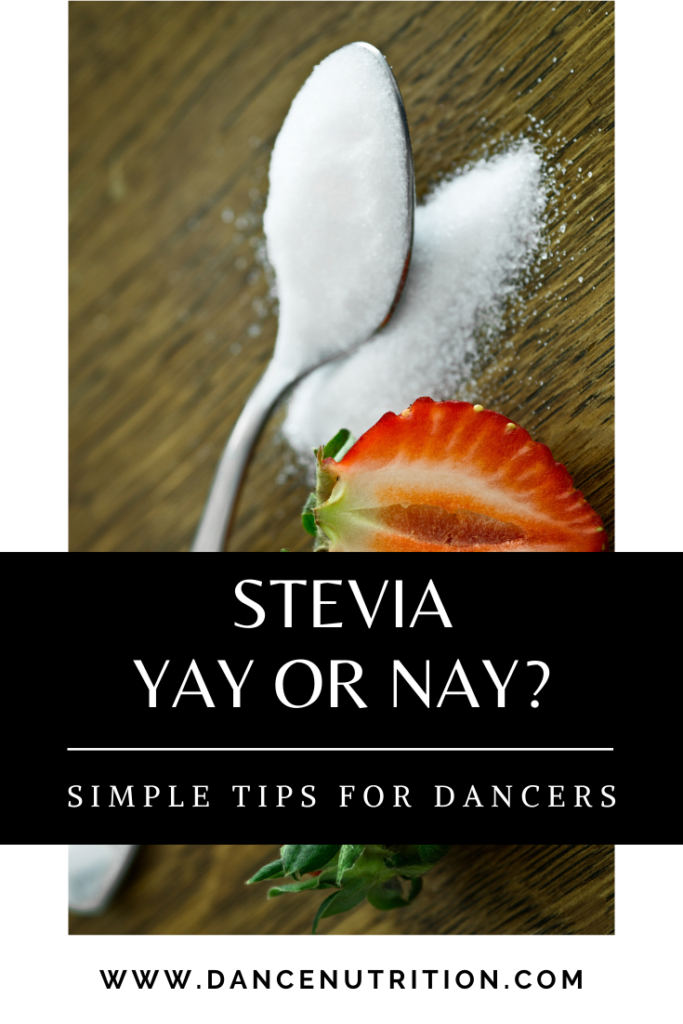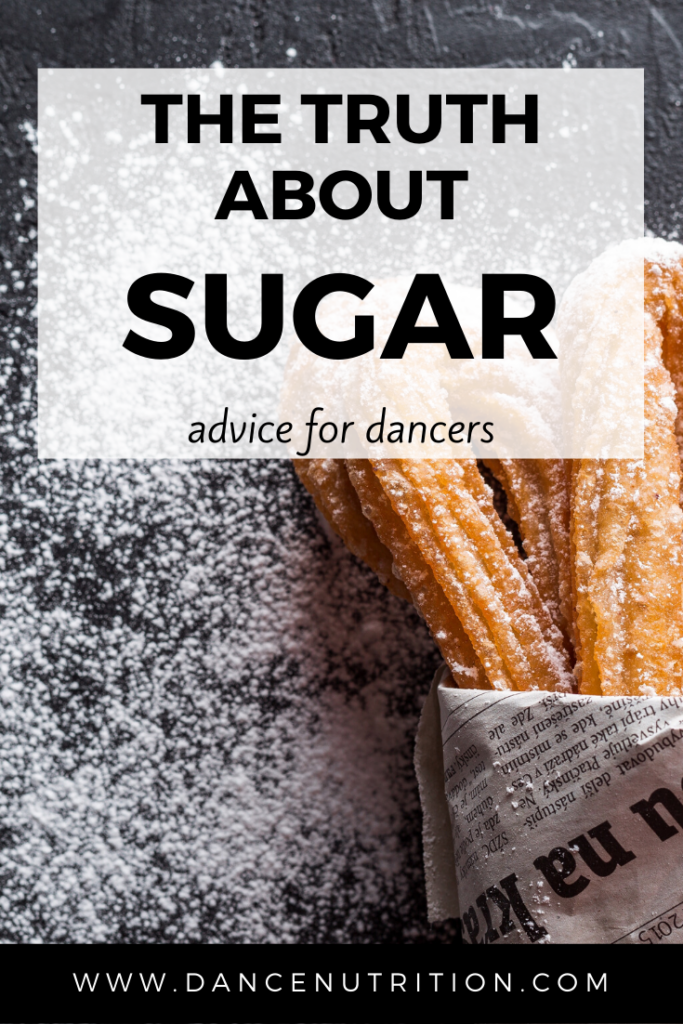Among the most debated dietary components of a dancer’s diet is sugar. High-sugar foods become a focal point of concern— an easy target to scrutinize by dancer diet culture. However, fearing and attempting to eliminate sugar from your diet can be misleading and detrimental to performance. In this article, we’ll explore why dancers should not fear sugar, dismantling the myths and regaining the ability to eat (even high-sugar foods) in a guilt-free and supportive way.
The role of sugar in a dancer’s body
In food, sugar is derived from carbohydrates. Upon digestion, the body converts sugar into glucose, a primary energy source for metabolic functioning. Since a dancer’s energy expenditure is significantly higher due to intense rehearsals and performances, glucose is crucial. Here are a few reasons why:
- Dancers require quick energy during classes. Simple sugars can provide an immediate energy boost, helping to sustain performance levels.
- After dancing, consuming carbohydrates, including sugars, helps to replenish glycogen, aiding recovery and preparing the body for the next class, rehearsal, or performance.
- Glucose is the primary fuel for the brain, helping to maintain mental alertness and concentration.
Point blank: eliminating sugar from your diet is not only discouraged, it’s practically impossible.
The types of sugar in your diet
Let’s distinguish between the different types of sugars and their sources:
#1: Natural Sugars
Natural sugars are found in fruits, vegetables, and dairy products. Most foods, even those you wouldn’t consider “sugary” like vegetables contain naturally-occurring sugars. In other words, they’re packaged by nature alongside other nutrients like vitamins, minerals, and fiber.
When various types of sugar, including white sugar, brown sugar, coconut sugar, cane sugar, maple syrup, honey, and molasses are in their simplest form, they are for the most part, nutritionally equal. Fructose, the sugar found in fruit, is comparable to lactose, the sugar found in dairy products. Regarding fruit and milk, the additional benefits of vitamins, minerals, protein, and fiber give these options a leg-up nutritionally.
#2: Added Sugars
Added sugars are added during the processing of foods, such as in baked goods, sweets, and many packaged snacks. Regarding packaged foods, the FDA defines “added sugars” as those added to foods during processing (including sugars from syrups and honey, and sugars from concentrated fruit or vegetable juices). Similar to high fructose corn syrup, added sugars are often added to packaged foods not just for flavor, but also for improvements in texture and shelf life.
Why is sugar demonized?
The nutritional characteristics of sugar begin to change with processing and refining. High fructose corn syrup (AKA “corn syrup” or “corn sugar”) is a food additive that came to the market in the mid-1900s. It’s added to many packaged foods as an economical sweetener that also helps to increase shelf life. Some research has shown that corn syrup, especially when consumed excessively, may negatively impact long-term health. Since corn syrup often hides in foods that are not even considered sweet (ie. sauces, condiments, marinades, savory fillings) and is the sweetener of choice in many sweetened beverages (ie. soda), it can be easy to overdo it unknowingly. Some also suggest an association between sugar and hyperactivity in children, but this has since been disproven.
Fast forward several decades and the general recommendation for Americans to “reduce added sugars” was introduced in the 2010 USDA Dietary Guidelines. But it wasn’t until 2018 when the USDA changed the Nutrition Facts Label to require that companies report “added sugars” in their foods, that consumer awareness sky-rocketed.
How Much Is Too Much?
Though added sugars offer no nutritional benefit, they need not be eliminated from our diet. Total elimination of added sugar is practically impossible and can lead to obsessively restrictive disordered eating habits.
It’s easy to forget the word “added” and focus heavily on “sugar.” Let’s not demonize something that happens to make food taste yummy! Regarding the research, we have to be more critical. The authors of a 2020 study even explain that there doesn’t seem to be published evidence demonstrating an association between diabetes and the intake of total sugar, added sugar, or table sugar. Furthermore, research shows that intuitive eating is associated with better diabetes management.
Is stevia a better alternative for dancers?
Non-nutritive (0-gram sugar) sweeteners are increasingly available and commonly added to packaged foods. While these alternatives allow for a sweet flavor without the added calories (or impact on blood sugar), they can create a false sense of sweetness, especially when used in excess. Though the research is not yet conclusive in human studies, it can be argued that how the body and brain respond to non-nutritive sweeteners is very complex. Here’s an example:
Splenda is 600 times sweeter than regular sugar. Ideally, if one uses the sweetener, they should need a much lesser amount of Splenda than regular sugar. Many consumers, however, replace standard sugar with artificial sweeteners in a 1:1 ratio. Can over-consuming these sweet flavors (whether from artificial sources like Spendla or “natural” sources like stevia) contribute to a diminished tolerance for less sweet foods (ie. fruits and veggies)?
Is sugar addicting?
Dopamine is a neurotransmitter that communicates motivation and the reinforcement of actions. When eating, the brain releases dopamine— especially in response to sweet flavors. Though some believe this to be a factor in driving patterns of over-eating, it’s more a reflection of survival. Humans are naturally equipped to prefer sweet flavors. This survival mechanism ensures that we’re motivated to seek food for fuel. Though we live in a world of excess, our bodies don’t know that. We’re biologically equipped to survive famine!
To date, no substantial evidence supports sugar as an addictive substance like drugs and alcohol. There are, however, studies to show food restriction as a likely cause of over-eating. Studies also show that when observing brain scans of dieters versus non-dieters, food restriction (among dieters) increases the reward response mentioned above. With carbs often being a first-line restriction among dieters, it makes sense why the motivation response (AKA craving) runs deep for sweeter, carb-rich foods. Simply put: food restriction is what drives over-eating, not the sugar.
Another interesting finding comes from a small study in 2020 that compared the impact of actual sugar intake versus perceived sugar intake on blood sugar levels. In this study, food labels from two identical beverages were disguised with one made to reflect a higher amount of sugar. Blood sugar levels rose more when consumers were given the beverage with the falsified nutrition facts label. So here’s the question: is it possible that our perception of nutrition facts impacts the amount we eat and drink?
Sugar in a dancer’s diet- key takeaways
Don’t fear sugar. Recognize sources of added sugar and if accessible, choose foods sweetened with less-refined sources like dried fruit, cane sugar, brown sugar, coconut sugar, maple syrup, honey, and molasses. These are all generally comparable to white granulated sugar, another *sweet* option. Timing also matters. Foods rich in simple sugars like sweets, juice, fruit snacks, and applesauce can be used strategically to ward off fatigue mid-performance.
Using the nutrition facts label and ingredients list can help, but should never turn obsessive. If you have a pre-existing medical condition like diabetes, then you’ll have to be extra mindful of these sources as they will impact your postprandial blood sugar. Reach out to a Registered Dietitian Nutritionist, specifically a Diabetes Educator to learn more.




